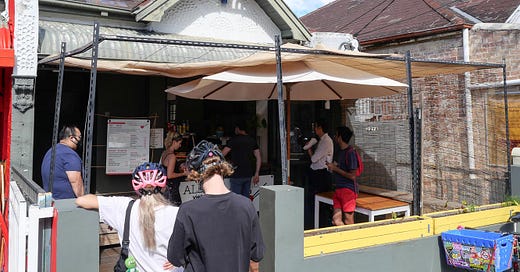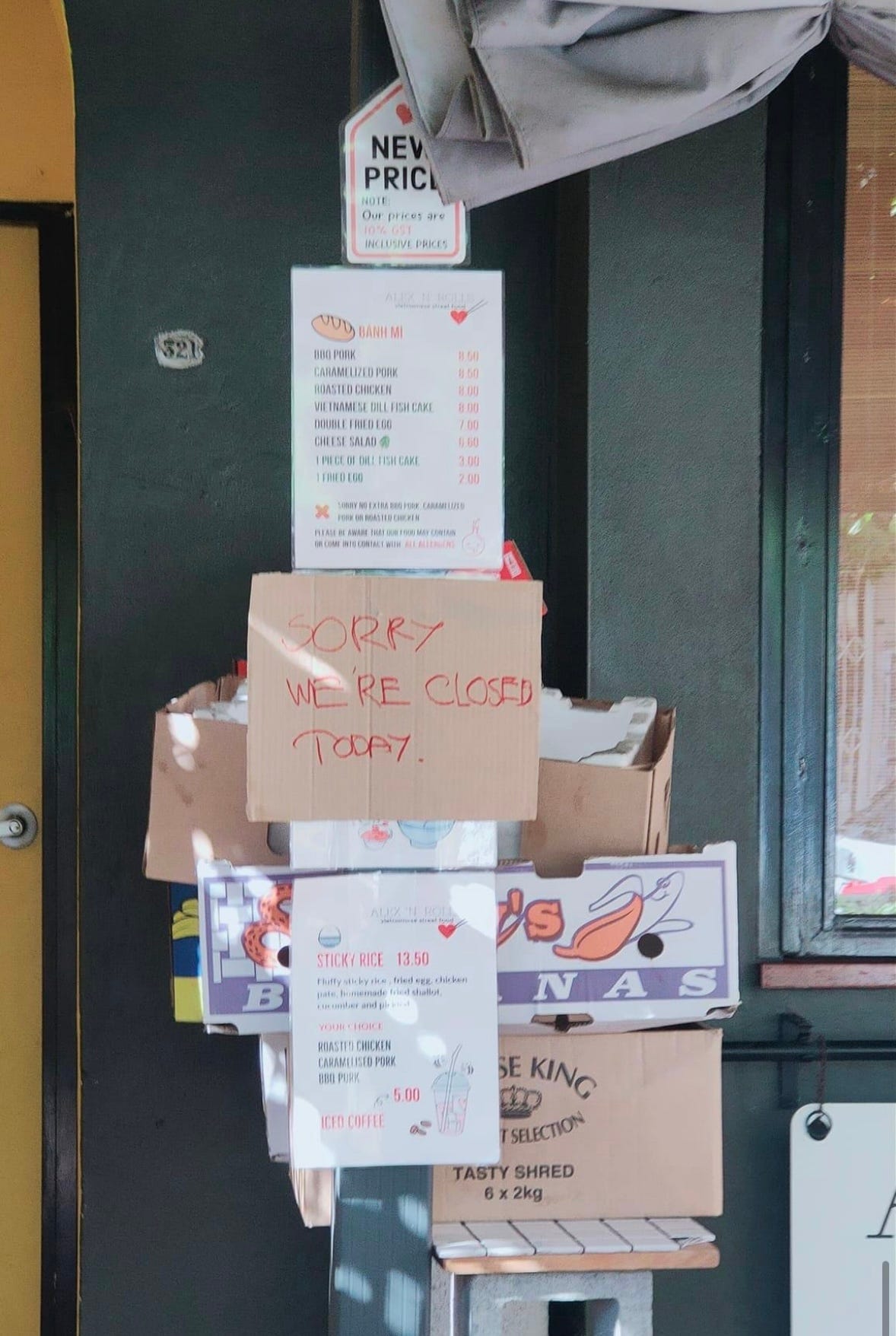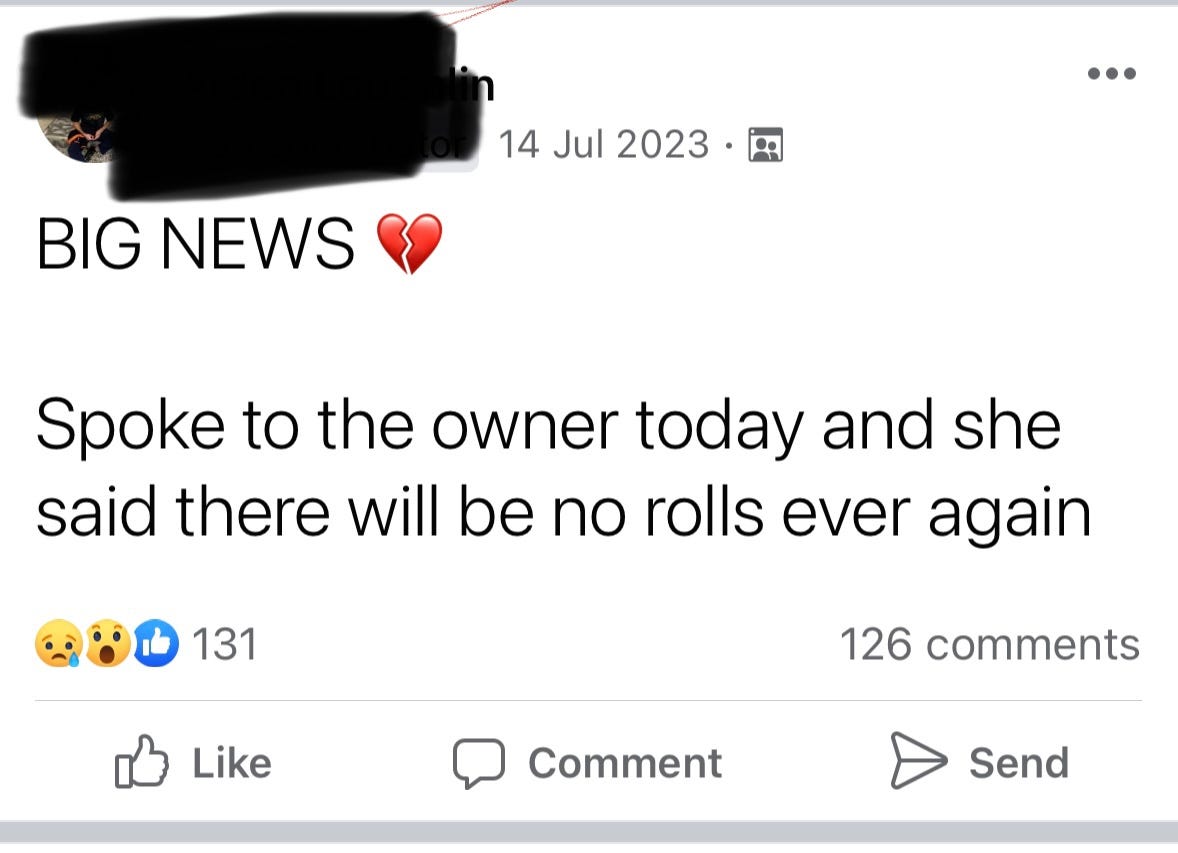“I went to a Lebanese restaurant last night and I ate raw liver” -
‘At Home in the Entrails of the West…’
Ghassan Hage
Alex ‘NO’ Rolls
For about a year the cult Bánh Mì store ‘Alex ‘N’ Rolls, operating out of the front/back of a house on Illawarra Road in the Vietnamese enclave of Marrickville, stopped serving food in bread rolls. A few months ago, they brought the rolls back.
Hey Alex! Why is this of any relevance to anything?
… would be a worthwhile question to ask, but for the almost 10 thousand people who are a part of the private facebook group called “is “ALEX ‘N’ ROLLS’ open” - which unsurprisingly monitors the store’s notoriously slippery opening schedule - the disappearance and subsequent (semi) return of the “rolls” is the most relevant thing to have ever occurred. Extending their definitely valid outrage, if we consider this phenomenon within the context of what I’ve called the Multicultural Economy (an economic system built to “exploit the necessary skills of migrants insofar as they appear beneficial to political/corporate ends”) I can’t help but see the decision to stop providing food in bread rolls as a reminder that at the centre of any capitalistic exchange of goods (interpersonally or globally) lies a human subject irreducible to that which they produce. A subject capable of agency and resistance.
Multi ‘CULTURAL’ Marrickville
Alex ‘N’ Rolls location in Marrickville is particularly significant to this story. Once a Grecian immigrant oasis and the artistic share-house/warehouse capital of Sydney, Marrickville has done the predictable thing and conducted itself in a manner eerily familiar to Gentrification. Now, I don’t want to throw that word around without weight. Doing Ket doesn’t make you Marxist. And hosting demolition parties as a fuck you to developers with your middle-class-mates who are definitely not homeless yet doesn’t make Gentrification claims substantive or unquestionable.
And this is because the ‘G’ process isn't just hot button topics like soaring housing prices or elimination of ethnic diversity. Marrickville remains “diverse” and there’s even a new affordable housing precinct providing rental options for those in need. ‘Gentrification’ as it relates to Marrickville has a ‘feel’ akin to corrupting privatised and political enclosures not unlike the birth of Capital in Elizabethan England or what Yanis Varoufakis gets close to calling the beginning of the end. Once-emigre’s-cum-Greek Oligarchs, private construction companies and the “art-focused” Inner West council have gone full King Lear and begun dividing the land for themselves/their families and in turn destroying or inauthentically recreating the “tenuous but treasured places and thrown-together parts” that make Marrickville what it is. If seen from this angle…maybe those demolition parties I wish I was invited to have something to them.
The always temporary but indeterminate co-living spaces, once genuinely dissident, are present but they’re now packaged as justification for broader market value. And the very visible working class Vietnamese who missed out on greater access to wealth and upward mobility by no fault of theirs (a too slow to dissolve White Australian Immigration policy) now find themselves at the feet of the Multicultural Economy and a new way to reproduce racialised and social stratification - what academic Ghassan Hage calls the Cosmopolitan Multicultural Eater.
‘COSMO’ Multi ‘CULTURAL’ Marrickville
Geopolitical policies of the 80s’ and 90s’ in Australia were defined by an obsession with multiculturalism as the key to global recognition, famously culminating in the 2000 Sydney Olympics. But the Olympics, and displays like it (the 1999 establishment of “harmony” day) are flashes, misdirects, Stalinist railway openings. The lived experience of multiculturalism made (and continues to make) itself apparent through the growing availability of culinary cultural diversity. Sydney CBD underwent rapid economic/cultural expansion and its search for a so-called “Australian” cuisine (which began in 1984 at the first Symposium for Australian Gastronomy) birthed a dichotomy between the Inner City elites and the suburbs of Western Sydney. This growing prestige required willing servants - the ‘Cosmopolitan Multicultural Eater’ - who began to view themselves as “culinary high priests”. These “priests” championed Sydney’s turn to global ‘cosmopolitan’ standards like cooking “goat” and saw the suburbs of Western Sydney as an “unsophisticated” before who were “less integrated into the circuit of international touristic capital” which was going to put so-called-Australia on the map!
Whilst this starting place may appear to be less than altruistic, it must be said that the metastasising Multicultural Economy slowly offered migrants an opportunity to express themselves and their culture in ways that no longer pandered to conservative western palates; people were all of a sudden very much into “weird raw beef” (Kibbe Knyah). The current problem lies more simply in who these daring eaters have become. Cosmo Multiculturalists once remarked with disdain at the “unsophisticated” West and their commitment to “Steak Diane!” but now they rummage through Marrickville, Campsie etc. in service to Suburban Safari’s (thanks Maeve O Mara). Why? And admittedly this is cynical, but there is a latent belief that access to and consumption of diverse dining options gestures towards a liberal ‘right side of history’. This is a dangerous false equivalence (see our recent media vilification of migrants) that presents an illusion Western Sydney writer Eda Gunaydin so easily skewers “I don’t imagine the site of the kebab shop as a utopic melting pot”.
“Is Alex ‘NO’ Rolls open?”
But are these avid Bánh Mì admirers a part of the problem? Are they a problematic extension of the ‘Cosmopolitan Multicultural Eaters' growing rapaciousness for “difference”, for “authenticity”? Possibly. A group committed to monitoring a presumably migrant run small business to this extent feels like an invasive attempt to capture the feeling of excitement and performative outsiderness one gets when a YumCha waiter doesn’t give two fucks about your coke with ice and lemon order.
We should primarily see the Facebook group’s surveillance as a sort of harmless phenomenological practice, committed to simply confirming Alex ‘N’ Rolls superior stature as irrefutable fact; and for this I can’t blame them. The reasons for ‘Alex’s’ appeal are multitude. The elusive opening hours undoubtedly initially provoked a sort of playful masochism in hopeful eaters (GG planning lunchbreaks) until the group found a way around this loophole. This initial intrigue pales in comparison though to the store's mouthwatering shop-front in the front/back (?) of the owners house (?) with its glass entombment of an array of glistening meats and a Patê mountain to rival that of the Inner city French gourmands. In our confusing reality objectivity is nigh impossible to come by, but for the group (and myself), Alex ‘N’ Rolls Bánh Mì as the city’s best offering entered into irrefutable fact territory; shout out the Dill Fish Cake Bánh Mì
Then the rolls stopped, or as a Facebook user’s pathetic fallacy put it, “one gloomy morning, disaster struck”. Rumours spread, posts circulated, and suddenly the rolls became as inconsistent as the opening hours. It went on like this for what felt like an eternity, until the 14th of July when the news was “confirmed” by a chance encounter with Alex’s business partner who said the unthinkable - “there will be no rolls ever again”, only sticky rice. Outrage, disbelief and hilarious perverted bargaining ensued; “Ima make the ultimate sacrifice and start sleeping with Alex for rolls”. The group's reaction is symptomatic of the Multicultural Economy; eater centered and varying in “degree to which they emphasise ethnic feeders as active central subjects”. There were few if any posts asking after the worker(s) in question and the majority of the comments/statements could be reduced to selfish, lunch related lamentations.
“NO ROLES EVER AGAIN”
But this self-centeredness slowly dissolved and in its place grew a new, previously unthinkable perspective. Seen in the definitely genuine calls to start a “community support group”, an increase in encounters with the store’s eponymous owner or better yet, a desire to politicise the bread-less reality by bringing this group trauma to the attention of the local member and Prime Minister, Anthony Albanese. And it’s these particularly stirring responses to the brief roll/role refusal that suggest what happened was momentous in some way. Whether the act was done with revolutionary foresight is beside the point. The reality is that a Bánh Mì place which already possessed an unadvisable aversion to our 21st century Marketing Realism dictum of ‘the lights must never go out’, doubled down and stopped selling its titular offering. The result was a cracking through of the lethargy, a forceful awakening of a possessed Cosmo Multicultural eating scene and a foregrounding of the people behind the bread.
The story of Alex ‘N’ Rolls’ roll/role refusal is an example of genuine ethnic diversity within the dining scene. One which resists the meritocratic ‘Australian’ dream and in doing so expands its very conditions. But we may not always have an Alex ‘N’ Rolls to be so brazen as to perform financial suicide in front of our surveilling eyes. Our job must turn inwards, asking questions of an obscuring system of relations between policy and capital which directly led to the making of a sort of “tamed wilderness” available to those who venture on Food Safari’s organised by Boomers. It means that whilst you or I slurp down 15 dollar noodles in Burwood we must pay more attention to our sunny disposition towards this tapestry of cultural diversity available to us. Just because we can eat different types of food does not mean our nation cares about different types of people.
The other day I read a recent brilliant pre-eulogy for Noam Chomsky on Jacobin (there were rumours he had died lol) and they summarised his politics quite simply as the belief that “political power flows from economic power, and economic power rests in the hands of the holders of capital”. Or said another way; the ability to create policy and decide on financial distribution resides with those that own the means of production. Under ‘Capital’ a deformation of the civil responsibility of those elected to represent has ensued and an evacuation of worker epistemology has taken place. So again I return one last time to the significance of the rolls/roles refusal to suggest that this peculiar suburban tale could be even more vital than my simple encouragement for introspection around consumer habits. This story contains within it the tools to firstly locate and then to fight against anti working-class, racially stratified Neoliberal policy and destructive populism/nationalism which masks its elitist roots.







